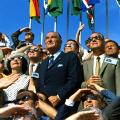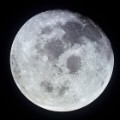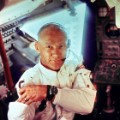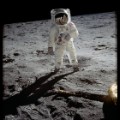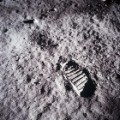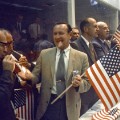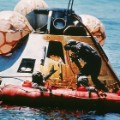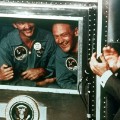(CNN)Here's a look at the life of astronaut Neil Armstrong.
Personal
Birth date: August 5, 1930
Death date: August 25, 2012
Birthplace: Wapakoneta, Ohio
Birth name: Neil Alden Armstrong
Father: Stephen Armstrong, auditor
Mother: Viola (Engel) Armstrong
Marriages: Carol (Held Knight) Armstrong (June 12, 1994-August 25, 2012, his death); Janet (Shearon) Armstrong (1956-1994, divorced)
Children: with Janet Shearon Armstrong: Mark Stephen, Karen Anne and Erik Alan
Education: Purdue University, (1947-1949, 1952-1955) B.S.; University of Southern California, M.A., 1970
Military Service: U.S. Navy, 1949-1952
Other Facts
Armstrong was an Eagle Scout and had his pilot's license before he had a driver's license.
He earned a Navy scholarship to Purdue. His studies were interrupted when he was called to active duty just before the beginning of the Korean War.
As a military and civilian pilot, he flew over 200 different models of aircraft, including jets, rockets, helicopters and gliders, including the X-1B and the X-15 rocket planes.
He said his famous statement after first landing on the moon was misheard, that what he really said was, "That's one small step for [a] man, one giant leap for mankind." It lost a syllable in transmission because of the microphone.
Timeline
August 5, 1946 - Receives his pilot's license.
1950-1952 - Combat fighter pilot during the Korean War, flying 78 missions and earning 3 air medals.
1955-1962 - Civilian test pilot.
September 17, 1962 - Neil Armstrong is part of the second group of men chosen by NASA to become astronauts.
March 16, 1966 - Command Pilot of Gemini 8. Along with Pilot David Scott, he successfully performs the first space docking between spacecraft.
July 16-July 24, 1969 - Command Pilot of the Apollo 11 mission. The three-man crew consists of Armstrong, Buzz Aldrin, and Michael Collins.
July 20, 1969 - After landing near Mare Tranquillitatis, Armstrong becomes the first man on the moon. He and Aldrin spend about two hours on the surface before rejoining Collins in the command module.
1969 - Receives the Presidential Medal of Freedom.
1970-1971 - Deputy Associate Administrator for Aeronautics at NASA.
1971-1979 - Professor of Engineering at the University of Cincinnati.
1978 - Receives the Congressional Space Medal of Honor.
1986 - Vice chairman to the Rogers Commission on the Space Shuttle Challenger accident.
March 19, 1993 - Inducted into the Astronaut Hall of Fame.
July 20, 1994 - Joins 19 other astronauts and US President Bill Clinton at a White House ceremony to commemorate the 25th anniversary of the Apollo 11 moon walk.
July 21, 2004 - Attends a White House ceremony with Aldrin and Collins marking the 35th anniversary of Apollo 11.
September 2006 - Voice recognition software finds the missing "a" in Armstrong's famous moon-landing quote. The speech was corrected to say "That's one small step for a man, one giant leap for mankind,"
October 2007 - Armstrong and 14 other astronauts, all Purdue University graduates, attend the university's dedication ceremony of the Neil Armstrong Hall of Engineering.
March 2010 - Armstrong, along with astronauts Jim Lovell, Eugene Cernan and others, visit US troops in Iraq and Afghanistan.
May 2010 - Testifies before congressional committees with Cernan, where they voice opposition to the president's plans for NASA and human spaceflight, and explain their views on why America should continue the space shuttle program.
November 16, 2011 - Receives the Congressional Gold Medal for Distinguished Astronauts along with Aldrin, Collins and John Glenn.
August 2012 - Has heart surgery.
August 25, 2012 - Passes away at the age of 82 following complications from cardiovascular procedures.
July 23, 2019 - According to a report from The New York Times, Armstrong's family was paid $6 million by a hospital in 2014 as part of a wrongful death settlement. Probate documents confirm the funds were distributed as part of a wrongful death and survival claim.











